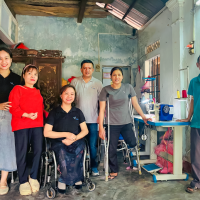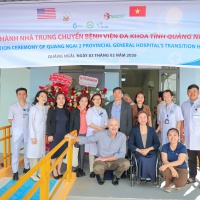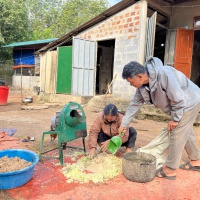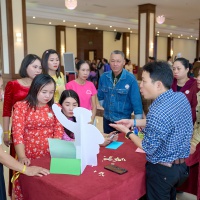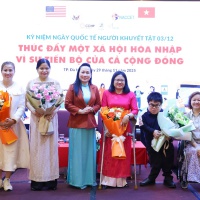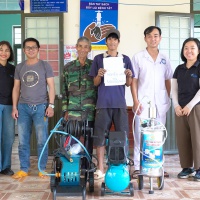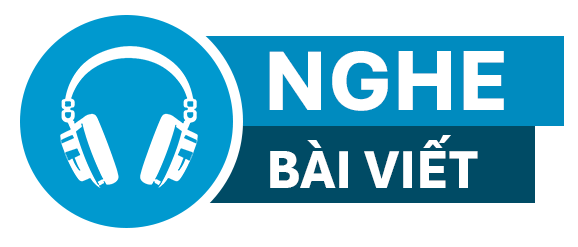
On October 11 and 12, 2025, in the communes of Cua Viet, Vinh Linh, and Ai Tu in Quang Tri province, three groups named "Hope," "Faith" and "Sustainability" launched the first group meeting in a series of five psychological support sessions dedicated to persons with disabilities and their family members facing emotional and mental difficulties. This activity marks the start of the psychological support group model under the project "Independent living and Social inclusion for persons with disabilities in Quang Tri province - Vietnam" implemented by the Action to the Community Development Institute (ACDC) and funded by Green Cross Switzerland (GCCH).
The first session saw the participation of 32 people, including 19 persons with disabilities and 13 family members. The model aims to create a safe space where persons with disabilities and their family members can meet, share, and learn together how to take care of their mental health - something that is often neglected amidst the difficulties of daily life.
With this spirit, the program is designed as "connecting circles," where, led by the group facilitators, members sit together in an open space to listen, understand, and find the motivation to care for their own and others' mental health.
The first session, themed "Getting Acquainted and Orientation," began with close and bonding activities: members introduced themselves, shared their expectations for joining the group, jointly agreed on group rules, and named their group to reflect a positive spirit. Participants were also guided to self-assess their current mood and share emotional difficulties they were facing, such as anxiety, fatigue, or life pressures. This step helps each member pay attention to and become more aware of their own mental state.
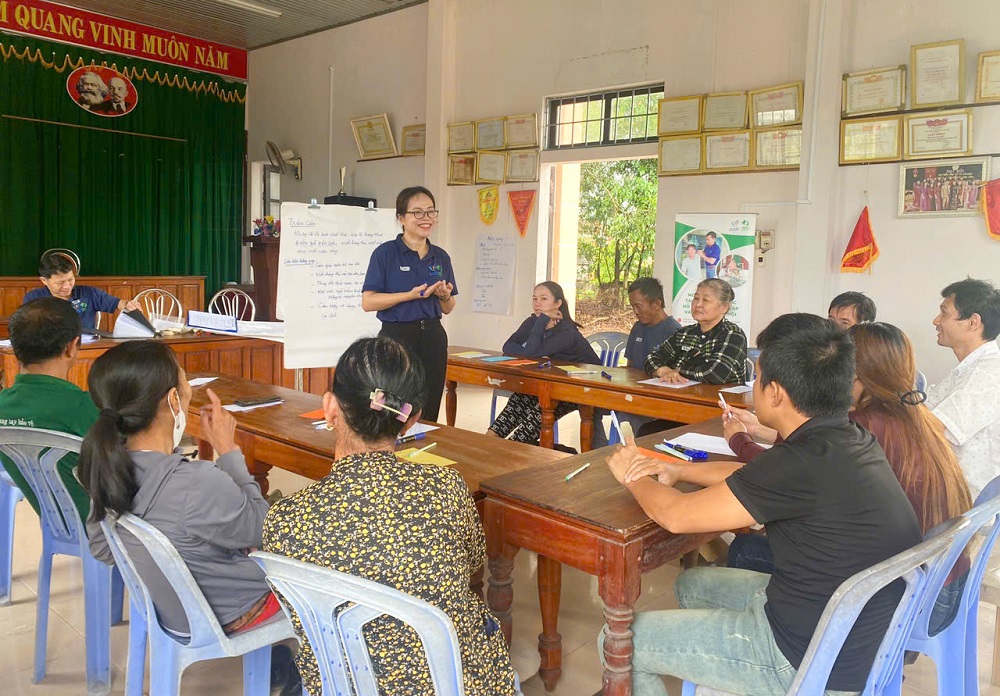
Under the guidance of the group facilitator during the psychological support session, participants were encouraged to share their feelings and personal experiences
The central part of the session focused on two main topics: Identifying emotional-mental difficulties and the relationship between thoughts, emotions, and behaviors. Members were guided to recognize the signs of common difficult emotional-mental states such as stress, anxiety, and depression. Through discussion, everyone realized that these symptoms could appear in anyone, and early recognition helps them proactively seek care and support when necessary.
Participants also explored the relationship between thoughts, emotions, and behaviors. Through practical examples, they understood that the way each person thinks about a situation can determine their feelings and reactions. Changing perception in a positive direction helps to regulate emotions, behaviors, and cope better with everyday situations.
The content was implemented using the experience - share - practice method, making it easy for participants to understand and apply in daily life. At the end of the session, the groups practiced deep breathing exercises for relaxation, which helped reduce stress and create a sense of calm. Many members reported feeling comfortable, relieved, and more peaceful after the session, while also recognizing the importance of taking care of their own mental health.
Positive emotions spread throughout each group session. Members expressed their joy, empathy, and the things they learned after the first meeting:
Mrs. H.T.H, a member of the "Hope" group, shared: "Everyone has difficulties and hardships. You have to know when to put them down to lighten your heart, because constantly carrying worries and sadness doesn't solve anything."
Mr. N.V.B.T, also a member of the "Hope" group, shared: "My mood is better after the session because I got to interact, meet people, participate in games, practice deep breathing, and learn how to cope when I face emotional difficulties."

Group members confidently shared their feelings and life experiences, creating an open and warm atmosphere during the session
Mrs. L.T.H, a member of the "Hope" group, expressed: "Through the content about stress, anxiety, and depression, I realized I have many of those signs. After the session, I understood more clearly about mental health and how to recognize and cope with emotional difficulties. Mental health needs to be cared for just like physical health."
Mrs. N.T.H, a member of the "Hope" group, said: "The session was fun and meaningful for me. When facing an unpleasant situation, I learned how to stay calm and re-examine the problem instead of thinking negatively or rushing."
Mrs. P.T.T.T, a member of the "Sustainability" group, shared: "The most useful thing I learned today was the signs of stress, anxiety, depression... and the skills to help me improve my emotional-mental well-being when I face difficulties."
Mrs. N.T.T, a member of the "Faith" group, also expressed: "The session was very useful; everyone was friendly and cheerful. Participating in the session helped my mood feel more comfortable compared to just staying at home."
At the end of the session, the groups completed a post-activity mood assessment, and the results showed that the majority of members had a clear improvement in their mood and expressed a desire to continue attending the subsequent sessions.
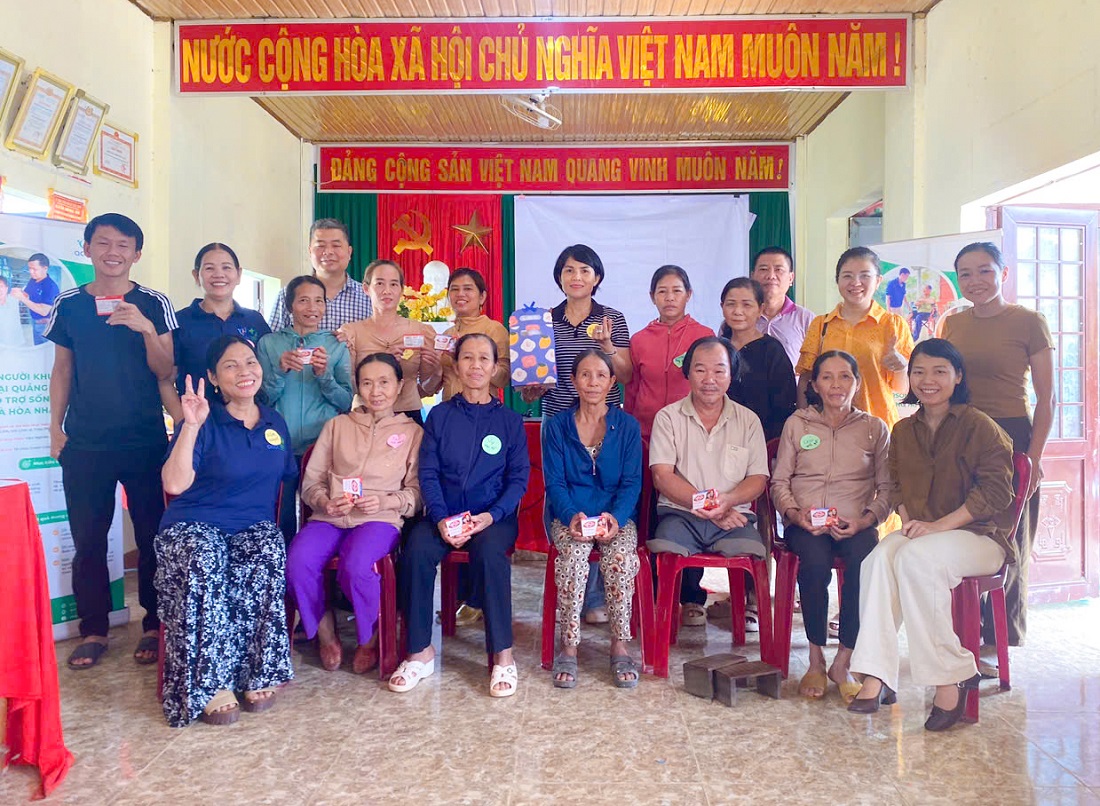
Members of the “Hope,” “Faith,” and “Sustainability” groups took a commemorative photo after their first session, in a joyful and bonding atmosphere
In the upcoming sessions, the program will continue with topics such as increasing meaningful activities, changing unhelpful thoughts, and practicing problem-solving skills... The three groups, "Hope," "Faith," and "Sustainability", are gradually becoming positive connecting points where persons with disabilities and their families accompany, learn from, and support each other in mental health care.
The activity was implemented collaboratively by ACDC, the Quang Tri Provincial Department of Health, and facilitated and led by staff from: Quang Tri College of Medicine and Health, Quang Tri Village Health Association, and members of the TOT group of the Quang Tri Provincial Association of Persons with Disabilities, Agent Orange Victims, Sponsors of Persons with Disabilities, and Protection of Children's Rights. This model is expected to spread the message: Mental healthcare is just as important as physical healthcare, because a resilient mind is the foundation for a healthy and balanced life.
